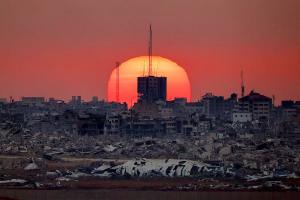Benjamin Netanyahu has a problem: he doesn’t have sufficient support to form a coalition. With 19 days left to complete this near impossible task, he is desperate; and, when backed into a corner, Netanyahu looks to Iran as his savior.
The timing of the recent explosion in Iran’s Natanz’s nuclear facility — and particularly the fact that Israel has done little to dispel the notion that it was to blame — suggests that the motivation was at least partially political.
This isn’t to say the attacks on Iran aren’t normally motivated by interests of national security. The threat of a nuclear-capable Iran is substantial: according to Iran, the Natanz nuclear site holds thousands of advanced centrifuges. These have been used to enrich uranium beyond the levels needed for civilian purposes, a clear violation of the terms of the nuclear deal.
A recent report by the IAEA revealed that Iran, in another major violation of the deal, has started producing uranium metal which is essential for the core of an atom bomb. Israel views Iran as its greatest threat and has successfully disrupted the nuclear program over the past decade using cyber attacks, bombings and assassinations of key personnel, including killing Iran’s top nuclear scientist, Mohsen Fakhrizadeh, in November 2020.
This attack is different. There are indications in the Israeli media that the informal information leaking from ‘anonymous sources’ is being strongly backed from Jerusalem. There is, uncharacteristically, near-bragging about the damage that may have been caused to the facility. This is not the first time an attack in Iran came at a convenient time for the Netanyahu, and it bears the hallmarks of such an event.
Israel’s fourth election in two years has produced bad results for Bibi, but luckily for him, the opposition isn’t doing any better. To establish a coalition he needs the support of the ultra-Orthodox parties, the far-right Religious Zionist party, the United Arab List and Naftali Bennett’s party, New Right. Without them there can be no coalition.
Ongoing negotiations were made more difficult when the leaders of the Religious Zionist party ruled out being in a coalition that includes the United Arab List. Bennett has in principle agreed to join, but is waiting to announce his final decision.
This is all happening at a time when Netanyahu’s corruption trial is underway, with witnesses for the prosecution painting a grim picture of Netanyahu’s moves to control media outlets by granting regulatory favors in return for positive news stories about himself and negative ones about his political rivals.
Netanyahu may hope that attacking Iran, one of the only issues on which there is consensus among the Israeli public, will play favorably for him. In the background is also the escalating war at sea between the two nations. Israel’s attacks on Iranian ships that illegally smuggle weapons or oil into Syria to support terrorism, or are used for espionage, have been kept under a veil of ambiguity since 2019. It is certainly within Israel’s security interests to disrupt actions that strengthen Hezbollah and promote terrorism against Israeli and Jewish targets. However, those can be kept secret and still be efficient, so it’s interesting to see whose interests are being served by making Israel’s actions public.
While it can increase deterrence to a point, the boasting about the latest attack on Iran has escalated the conflict and forced Iran to retaliate by attacking Israeli ships. This escalation, which could be made worst by the bombing in Natanz, can be employed by Bibi to create a sense of urgency in addressing the Iranian threat, requiring political stability and leadership.
This, Bibi might hope, will pressure the parties involved in the negotiations to show more flexibility in their demands and form a government — or at the very least provide Bibi with a basis for forming an unstable and dysfunctional minority government — which will keep him in power.
While the attack in Iran comes at a convenient time for Bibi, Joe Biden’s government is not pleased. The United States has been engaged in indirect talks with Iran in Vienna, and although the gap between the two sides remains substantial, the US has hopes of reviving the nuclear deal. Israeli interference at this point can undermine and complicate those efforts. It could also play into the hands of the conservative fractions in Iran who object to negotiations with the US. The Americans have consequentially distanced themselves from the explosion in Natanz, in a move that may indicate growing tensions between Israel and its most powerful and important ally.
Attacking Iranian nuclear and military targets is a part of Israel’s national security strategy. Making those attacks public and admitting to them — even if unofficially — can pose further security threats, escalate tension and cause friction between Israel and its allies. Mostly, this benefits Netanyahu, who has, time and time again, placed personal interests first. King Bibi, it seems, will resort to desperate measures to ensure he maintains his grip on power.
This article was originally published on The Spectator’s UK website.

























